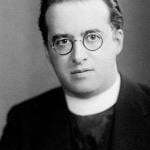
I continue my critiques of Why I Became an Atheist, by John W. Loftus.
I first ran across former Christian minister Loftus back in 2006. We dialogued about the problem of evil, and whether God was in time. During that period I also replied to an online version of his deconversion: which (like my arguments about God and time) he didn’t care for at all. I’ve critiqued many atheist deconversion stories, and maintain a very extensive web page about atheism. In 2007 I critiqued his “Outsider Test of Faith” series: to which he gave no response. Loftus’ biggest objection to my critique of his descent into atheism was that I responded to what he called a “brief testimony.” He wrote in December 2006 (his words in blue henceforth):
Deconversion stories are piecemeal. They cannot give a full explanation for why someone left the faith. They only give hints at why they left the faith. It requires writing a whole book about why someone left the faith to understand why they did, and few people do that. I did. If you truly want to critique my deconversion story then critique my book. . . . I challenge you to really critique the one deconversion story that has been published in a book. . . . Do you accept my challenge?
I declined at that time, mainly (but not solely) for the following stated reason:
If you send me your book in an e-file for free, I’d be more than happy to critique it. I won’t buy it, and I refuse to type long portions of it when it is possible to cut-and-paste. That is an important factor since my methodology is Socratic and point-by-point. . . . You railed against that, saying that it was a “handout.” I responded that you could have any of my (14 completed) books in e-book form for free.
Throughout August 2019, I critiqued Dr. David Madison, a prominent contributor to Loftus’ website, Debunking Christianity, no less than 35 times. As of this writing, they remain completely unanswered. I was simply providing (as a courtesy) links to my critiques underneath each article of Dr. Madison’s, till Loftus decided I couldn’t do that (after having claimed that I “hate” atheists and indeed, everyone I disagree with). I replied at length regarding his censorship on his website. Loftus’ explanation for the complete non-reply to my 35 critiques was this: “We know we can respond. It’s just that we don’t have the time to do so. Plus, it’s pretty clear our time would be better spent doing something else than wrestling in the mud with you.” Meanwhile, I discovered that Dr. Madison wrote glowingly about Loftus on 1-23-17:
When the history of Christianity’s demise is written (it will fade eventually away, as do all religions), your name will feature prominently as one who helped bring the world to its senses. Your legacy is secure and is much appreciated.
This was underneath an article where Loftus claimed: “I’ve kicked this dead rodent of the Christian faith into a lifeless blob so many times there is nothing left of it.” I hadn’t realized that Loftus had single-handedly managed to accomplish the stupendous feat of vanquishing the Hideous Beast of Christianity (something the Roman Empire, Muslims, Communists, and many others all miserably failed to do). Loftus waxed humbly and modestly ten days later: “I cannot resist the supposition that my books are among the best. . . . Every one of my books is unique, doing what few other atheist books have done, if any of them.”
These last three cited statements put me “over the edge” and I decided to buy a used copy of his book, Why I Became an Atheist (revised version, 2012, 536 pages) and critique it, as he wanted me to do in 2006. Moreover, on 8-27-07 he made a blanket challenge about the original version of this book: “I challenge someone to try this with my book. I might learn a few things, and that’s always a goal of mine. Pick it up and deal with as many arguments in it that you can. Deal with them all if you can.” His wish is granted (I think he will at length regret it), and this will be my primary project (as a professional apologist) in the coming weeks.
Despite all his confident bluster, I fully expect him to ignore my critiques: just like Madison and “Bible Basher” Bob Seidensticker, who also has ignored 35 of my critiques (that he requested I do). If Loftus decides to defend his views, I’m here; always have been. And I won’t flee for the hills, like atheists habitually do, when faced with substantive criticism.
The words of John Loftus will be in blue.
*****
The first thing we notice is that the Hebrew God is pictured with a body, just like the gods of their polytheistic neighbors. The gods of surrounding cultures had human and physical characteristics. There is no reason to suppose the Hebrews thought differently about their God fro what we read in the early parts of the Old testament. What we have in the Bible is an evolving understanding of the nature of God, so we find later statements to the contrary. In the New Testament, “God is a Spirit” (John 4:24). (pp. 259-260)
As to the “evolving God in the Bible” myth, see my papers:
[I]t is accepted as a major axiom of Judaism, from the biblical period onward, that no material representation of the Deity is possible or permissible. . . .*The evolutionary approach to the study of religion, which mainly developed in the 19th century, suggested a line of development beginning with anthropomorphic concepts and leading up to a more purified spiritual faith. It argued, among other things, that corporeal representations of the Deity were more commonly found in the older portions of the Bible than in its later books. This view does not distinguish between the different possible explanations for anthropomorphic terms. It especially fails to account for the phenomenon common in the history of all cultures, that sometimes a later period can be more primitive than an earlier one. In fact, both personifications of the Deity as well as attempts to avoid them are found side by side in all parts of the Bible. . . .*More important from a theological perspective are the anthropopathisms, or psychical personifications of the Deity. Scripture attributes to God love and hate, joy and delight, regret and sadness, pity and compassion, disgust, anger, revenge, and other feelings. Even if one explains these terms as being nothing but picturesque expressions, intended to awaken within man a sense of the real presence of God and His works, nonetheless they remain personifications. . . .*Ultimately, every religious expression is caught in the dilemma between, on the one hand, the theological desire to emphasize the absolute and transcendental nature of the Divine, thereby relinquishing its vitality and immediate reality and relevance, and on the other hand, the religious need to conceive of the Deity and man’s contact with Him in some vital and meaningful way. Jewish tradition has usually shown preference for the second tendency, and there is a marked readiness to speak of God in a very concrete and vital manner and not to recoil from the dangers involved in the use of apparent anthropomorphisms. . . .*There is no evidence of any physical representation of God in Jewish history (in contradistinction to the worship of Canaanite and other foreign gods by Israelites). Even the golden calves of Jeroboam represented, according to the view of most scholars, only a footstool for the invisible God. In archaeological excavations no images of the God of Israel have been unearthed. . . .*Although Jews have speculated on the anthropomorphic nature of God, visible representation of the Deity was clearly forbidden by the Mosaic law.
Deuteronomy 6:4 (RSV) Hear, O Israel: The LORD our God is one LORD; (cf. Mk 12:29; 1 Cor 8:6; Eph 4:5-6; 1 Tim 2:5; Jas 2:19)
Deuteronomy 32:39 . . . there is no god beside me . . .
Isaiah 37:20 . . . thou alone art the LORD. (cf. 37:16)
Isaiah 43:10 . . . Before me no god was formed, nor shall there be any after me.
Isaiah 44:6 . . . I am the first and I am the last; besides me there is no god.
Isaiah 44:8 . . . Is there a God besides me? There is no Rock; I know not any. (46:6, 9; Mal 2:10)
Isaiah 45:5 I am the LORD, and there is no other, besides me there is no God; . . . (cf. 45:6, 22)
Isaiah 45:21 . . . And there is no other god besides me, . . . there is none besides me.
Isaiah 46:9 . . . I am God, and there is no other; I am God, and there is none like me,
Psalms 31:6 Thou hatest those who pay regard to vain idols; but I trust in the LORD.Psalms 40:4 . . . those who go astray after false gods!Psalms 97:7 All worshipers of images are put to shame, who make their boast in worthless idols;Psalms 106:36 They served their idols, which became a snare to them.Psalms 115:3-8 Our God is in the heavens; he does whatever he pleases. [4] Their idols are silver and gold, the work of men’s hands. [5] They have mouths, but do not speak; eyes, but do not see. [6] They have ears, but do not hear; noses, but do not smell. [7] They have hands, but do not feel; feet, but do not walk; and they do not make a sound in their throat. [8] Those who make them are like them; so are all who trust in them. (cf. 135:15-18)
The dating of individual psalms poses an extremely difficult problem, as does the question of their authorship. They were evidently written over a number of centuries, from the early monarchy to post-Exilic times, reflecting the varying stages of Israel’s history and the varying moods of Israel’s faith.
Leviticus 19:4 Do not turn to idols or make for yourselves molten gods: I am the LORD your God.
Deuteronomy 32:21 They have stirred me to jealousy with what is no god; they have provoked me with their idols. . . .
Isaiah 37:19 . . . for they were no gods, but the work of men’s hands, wood and stone . . .
Isaiah 42:17 They shall be turned back and utterly put to shame, who trust in graven images, who say to molten images, “You are our gods.”
Isaiah 44:10 Who fashions a god or casts an image, that is profitable for nothing?
Isaiah 44:15 . . . he makes a god and worships it, he makes it a graven image and falls down before it.
Isaiah 44:17 And the rest of it he makes into a god, his idol; and falls down to it and worships it . . .
Isaiah 46:6-7 Those who lavish gold from the purse, and weigh out silver in the scales, hire a goldsmith, and he makes it into a god; then they fall down and worship! [7] They lift it upon their shoulders, they carry it, they set it in its place, and it stands there; it cannot move from its place. If one cries to it, it does not answer or save him from his trouble.
Isaiah 48:5 I declared them to you from of old, before they came to pass I announced them to you, lest you should say, `My idol did them, my graven image and my molten image commanded them.’
Habakkuk 2:18 What profit is an idol when its maker has shaped it, a metal image, a teacher of lies? For the workman trusts in his own creation when he makes dumb idols!
(cf. Ex 32:1-8 [golden calf] and New Testament: 1 Cor 8:4-6 [“so-called gods”]; Gal 4:8 [“beings that by nature are no gods”])
Exodus 20:4 [Ten Commandments] You shall not make for yourself a graven image, or any likeness of anything that is in heaven above, or that is in the earth beneath, or that is in the water under the earth; (cf. Dt. 5:8)*Leviticus 26:1 You shall make for yourselves no idols and erect no graven image or pillar, and you shall not set up a figured stone in your land, to bow down to them; for I am the LORD your God.*Deuteronomy 4:16 beware lest you act corruptly by making a graven image for yourselves, in the form of any figure, the likeness of male or female, (cf. 4:23, 25)
*
***
Photo credit: Clandestino (4-23-15) [Pixabay / Pixabay License]
***













